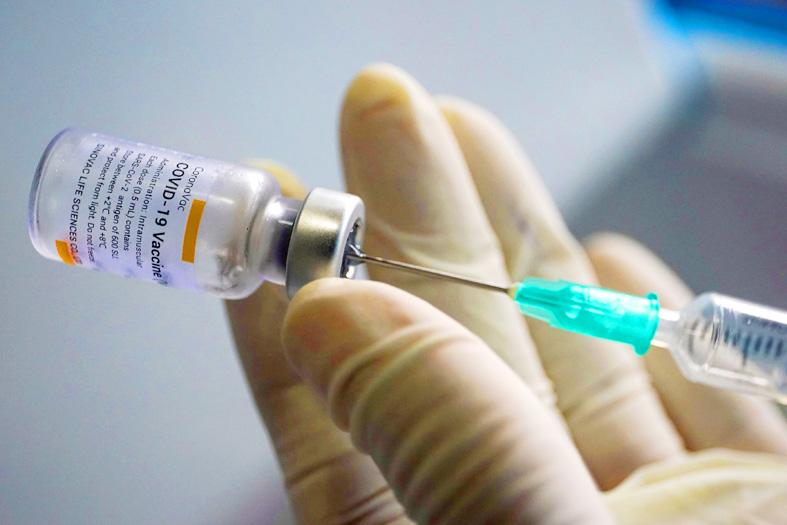The Central Epidemic Command Center (CECC) is discussing the possibility of allowing people abroad who have been vaccinated against COVID-19 — including with Chinese vaccines — to spend less time in quarantine after arriving in Taiwan, said Minister of Health and Welfare Chen Shih-chung (陳時中), who heads the center.
In an interview published yesterday in the Chinese-language United Daily News, Chen said that the center is considering reopening the nation’s borders in two stages based on vaccination coverage rates in Taiwan.
The plan for the first stage, when the coverage rate is relatively low, is that inbound travelers can apply for a seven-day quarantine if they have been inoculated overseas, including with Chinese vaccines, but approval would be based on the result of a mandatory COVID-19 test, the minister said.

Photo: Reuters
In the second stage, when the vaccination rate is more than 60 percent, inbound travelers might be exempted from compulsory quarantine, but the decision would be made according to the situation then, he said.
When asked for confirmation of the comments, Centers for Disease Control Deputy Director-General Philip Lo (羅一鈞), deputy chief of the CECC’s medical response division, yesterday said that the policy is being discussed, but there are scientific and technical challenges.
Asked whether China’s Sinovac vaccine, which was reported to have only about a 50 percent efficacy rate, would also be recognized, Lo said that the policy is to recognize “the fact that the individual has been vaccinated against COVID-19 in another country,” so it would not target any particular vaccine.
The law bans the government from purchasing vaccines manufactured in China, but the planned policy would not exclude travelers who received them, either in China or elsewhere, Lo said.
However, while Chinese vaccine manufacturers have released their own reports, so far final results of phase 3 clinical trials have not been published in accredited international medical journals, and none of them have been authorized by the WHO, the European Medicines Agency or the US Food and Drug Administration, he said.
Therefore, the plan is for inbound travelers who submit proof of having been vaccinated overseas to get paid-out-of-pocket tests after seven days of quarantine in Taiwan and be released from quarantine if the results are acceptable, he said.
The tests would include a polymerase chain reaction and antibody tests, Lo said, but added that there are scientific and technical challenges over how to set standards for antibody tests to ensure that the result indicates that an individual has enough protection against COVID-19.
CECC specialists are still collecting data for further discussion, he added.
Separately, Huang Li-min (黃立民), head of National Taiwan University Hospital’s pediatrics department and a specialist in infectious diseases, said that several countries that have administered the Sinovac vaccine are still finding it difficult to control their COVID-19 situation, so recognizing Chinese vaccines might be risky.
Asked about the proposed policy, a 28-year-old woman surnamed Chen (陳) said that she does not believe in the efficacy of Chinese vaccines, so people who have been given them might risk infecting people in Taiwan.
The center should not risk the health of people in Taiwan to show friendliness toward China, she said.
Additional reporting by Yang Yuan-ting

The US government has signed defense cooperation agreements with Japan and the Philippines to boost the deterrence capabilities of countries in the first island chain, a report by the National Security Bureau (NSB) showed. The main countries on the first island chain include the two nations and Taiwan. The bureau is to present the report at a meeting of the legislature’s Foreign Affairs and National Defense Committee tomorrow. The US military has deployed Typhon missile systems to Japan’s Yamaguchi Prefecture and Zambales province in the Philippines during their joint military exercises. It has also installed NMESIS anti-ship systems in Japan’s Okinawa

‘WIN-WIN’: The Philippines, and central and eastern European countries are important potential drone cooperation partners, Minister of Foreign Affairs Lin Chia-lung said Minister of Foreign Affairs Lin Chia-lung (林佳龍) in an interview published yesterday confirmed that there are joint ventures between Taiwan and Poland in the drone industry. Lin made the remark in an exclusive interview with the Chinese-language Liberty Times (the Taipei Times’ sister paper). The government-backed Taiwan Excellence Drone International Business Opportunities Alliance and the Polish Chamber of Unmanned Systems on Wednesday last week signed a memorandum of understanding in Poland to develop a “non-China” supply chain for drones and work together on key technologies. Asked if Taiwan prioritized Poland among central and eastern European countries in drone collaboration, Lin

Renewed border fighting between Thailand and Cambodia showed no signs of abating yesterday, leaving hundreds of thousands of displaced people in both countries living in strained conditions as more flooded into temporary shelters. Reporters on the Thai side of the border heard sounds of outgoing, indirect fire yesterday. About 400,000 people have been evacuated from affected areas in Thailand and about 700 schools closed while fighting was ongoing in four border provinces, said Thai Rear Admiral Surasant Kongsiri, a spokesman for the military. Cambodia evacuated more than 127,000 villagers and closed hundreds of schools, the Thai Ministry of Defense said. Thailand’s military announced that

CABINET APPROVAL: People seeking assisted reproduction must be assessed to determine whether they would be adequate parents, the planned changes say Proposed amendments to the Assisted Reproduction Act (人工生殖法) advanced yesterday by the Executive Yuan would grant married lesbian couples and single women access to legal assisted reproductive services. The proposed revisions are “based on the fundamental principle of respecting women’s reproductive autonomy,” Cabinet spokesperson Michelle Lee (李慧芝) quoted Vice Premier Cheng Li-chiun (鄭麗君), who presided over a Cabinet meeting earlier yesterday, as saying at the briefing. The draft amendment would be submitted to the legislature for review. The Ministry of Health and Welfare, which proposed the amendments, said that experts on children’s rights, gender equality, law and medicine attended cross-disciplinary meetings, adding that